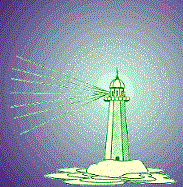 Question
13 from
Question
13 from
The Most Commonly Asked Questions About
A Course in Miracles
Chapter 2: THE NATURE OF THE SEPARATION
13) Does A Course in Miracles
really mean that God did not create the entire physical universe?
We answer this question with a resounding affirmative! Since nothing of form, matter, or substance can be of God, then nothing of the physical universe can be real, and there is no exception to this. Workbook Lesson 43 states, in the context of perception, which is the realm of duality and separation:
Perception is not an attribute of God. His is the realm of knowledge....In God you cannot see. Perception has no function in God, and does not exist (W-pI.43.1:1-2; 2:1-2).In the clarification of terms we find the following crystal clear statement about the illusory nature of the world of perception, which God did not create:
The world you see is an illusion of a world. God did not create it, for what He creates must be eternal as Himself. Yet there is nothing in the world you see that will endure forever. Some things will last in time a little while longer than others [e.g., the greater cosmos, as we shall see below in a passage from the text). But the time will come when all things visible will have an end (C-4. 1).And finally, a similar statement in the text:
God's laws do not obtain directly to a world perception rules, for such a world could not have been created by the Mind to which perception has no meaning. Yet are His laws reflected everywhere [through the Holy Spirit]. Not that the world where this reflection is, is real at all. Only because His Son believes it is, and from His Son's belief He could not let Himself be separate entirely. He could not enter His Son insanity with him ... (T-25.111.2; italics ours).These passages are important, because they clarify a source of misunderstanding for many students of A Course in Miracles who maintain that Jesus is teaching that God did in fact create the world. They assert that all the Course is teaching is that he did not create our misperceptions of it. Statements which contain the phrase "the world you see," as in the above passage from the manual for teachers, do not apply simply to the world we perceive through our wrong-minded lens, but rather to the fact that we see at all. Again, the entire physical universe, the world of perception and form, is illusory and outside the Mind of God.
Therefore, nothing that can be observed -- nothing that has form, physicality, moves, changes, deteriorates, and ultimately dies -- is of God. A Course in Miracles is unequivocal about this, which is why we speak of it as being a perfect non-dualistic thought system: It contains no exceptions. And so the seeming majesty of the cosmos and perceived glory of nature are all expressions of the ego's thought system of separation, as we see in this wonderful passage from the text:
What seems eternal all will have an end. The stars will disappear, and night and day will be no more. All things that come and go, the tides, the seasons and the lives of men; all things that change with time and bloom and fade will not return. Where time has set an end is not where the eternal is (T-29.VI.2:7- I0).To attempt to make an exception to this fact is to attempt a compromise with truth, exactly what the ego wants in order to establish its own existence. As Jesus states in the workbook: "What is false is false, and what is true has never changed" (W-pII.10.1:1). And again in the text:
How simple is salvation! All it says is what was never true is not true now, and never will be. The impossible has not occurred, and can have no effects. And that is all (T-31.1.1:1-4).In conclusion, therefore, no aspect of the illusion can be accorded truth, which means that absolutely nothing in the material universe has come from God, or is even known by Him. His reality is totally outside the world of dreams.
Reproduced with the kind permission of Gloria and Kenneth
Wapnick and the Foundation for A Course in Miracles
- ACIM Glossary-Index
- ACIM Theory
- What is Forgiveness?
- Foundation for Inner Peace ACIM-Archival site: ACIM-Archives.org
- Foundation for Inner Peace Online Store Catalog - A Course in Miracles
- Purchase: The Most Commonly Asked Questions About A Course in Miracles
- Foundation for A Course in Miracles Newsletter: The Lighthouse
-
Links